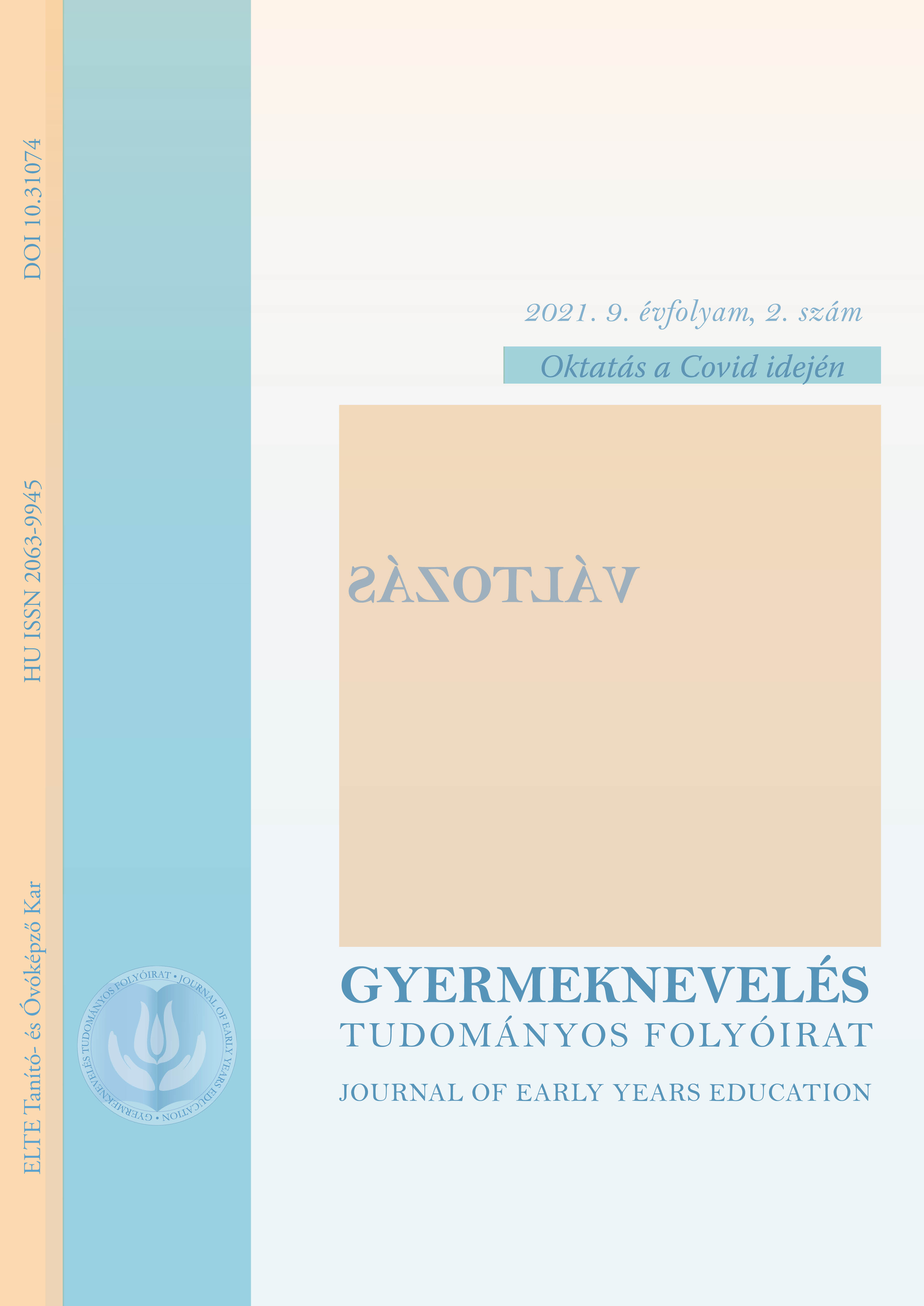Alternative Approaches to the Teaching Practice: Offline, Online and Hybrid Solutions during the Coronavirus Pandemic
DOI:
https://doi.org/10.31074/gyntf.2021.2.256.285Keywords:
teacher education, teaching practice, mentoring, coronavirus (Covid19), participatory researchAbstract
The years 2020 and 2021 were critical periods worldwide due to the coronavirus pandemic. The ever-changing quarantine situation resulting from the epidemic posed severe challenges for Hungarian education too. The closure of educational institutions required an enforced transition from physical attendance at school to remote teaching in matter of days. In achieving this, the Hungarian teaching community demonstrated high levels of professionalism, flexibility, innovation and determination. This article presents some possible best practices and offers solutions to one of the most difficult challenges: the planning, organisation and implementation of a course of teaching practice during the pandemic, carried out jointly by a teacher training institution and a primary school. Of the eight alternatives proposed for offline, online and hybrid teaching, the article focuses on reverse mentoring and team peer-teaching. Experiences based on this research project suggest that these techniques successfully develop student teachers’ pedagogical competencies, and have a positive impact on motivation, reflection and pedagogical awareness for all participants (students and tutors alike), even in such unpredictable times.
Downloads
References
Argente-Linares, E., M. Carmen Pérez-López & Celia Ordóñez-Solana (2016). Practical Experience of Blended Mentoring in Higher Education. Mentoring & Tutoring: Partnership in Learning, 24(5), 399–414, https://www.doi.org/10.1080/13611267.2016.1273449
Bencsik, A. & Juhász, T. (2016). A mentorálás, mint a tudásátadás formája Magyarországon. Gradus, 3(1), 179–184. http://real.mtak.hu/110297/ (2021.06.20.)
Coyle, D., Hood, P. & Marsh, D. (2010). CLIL. Content and Language Integrated Learning. Cambridge University Press.
ELTE JOKT koronavírussal kapcsolatos tájékoztatói https://www.elte.hu/content/koronavirussal-kapcsolatos-tajekoztatok-cikkek.c2c.316 (2021.07.11.)
ELTE TÓK tantervi tájékoztató, tanító szak, nappali tagozat https://www.tok.elte.hu/dstore/document/876/NTK_taj_2019_Bp_KKKvm.pdf (2021. 07.11.)
Fromann, R. (2017). Játékoslét – A gamifikáció világa, Typotex.
Hunya, M. (2014). Reflektív pedagógus – reflektív gyakorlat. Oktatáskutató és fejlesztő Intézet. https://ofi.oh.gov.hu/publikacio/reflektiv-pedagogus-reflektiv-gyakorlat (2021.06.16.)
Káplár-Kodácsy K. & Dorner H. (2017). Felnőttkori tanulási modellek a reflektív gyakorlat szolgálatában. A mentori munka mint felnőttkori tanulásszervezési forma. Neveléstudomány. Oktatás – Kutatás – Innováció, 5(3), 31–49. https://www.doi.org/10.21549/NTNY.19.2017.3.3
Marsh, D. & Langé, G. (2000, Eds.). Using Languages to Learn and Learning to Use Languages. University of Jyväskylä.
Mehisto, P., Marsh, D. & Frigols, M. J. (2008). Uncovering CLIL. Content and Language Integrated Learning in Bilingual and Multilingual Education. Macmillan.
Morris, L. V. (2017). Reverse Mentoring: Untapped Resource in the Academy? Innovative Higher Education,42, 285–287. https://doi.org/10.1007/s10755-017-9405-z.
Nemzeti Jogszabálytár gyűjteménye a veszélyhelyzettel kapcsolatos jogszabályokról, kormányrendeletekről https://njt.hu/search/vesz%C3%A9lyhelyzet:-:-:-:-:-:-:-:-:-/
/10 (2021.07.11)
Prekopa, D., Seresné B. E. & Tókos K. (2015). Hazai „jó gyakorlatok” a pedagógusképzés gyakorlati elemeinek megújítására. http://pedagoguskepzes.elte.hu/images/anyagok/ii1/32_hazai_jo_gyakorlatok.pdf (2021.06.15.)
Prievara, T. (2015). A 21. századi tanár. Neteducatio.
Szivák, J. (2014). Reflektív elméletek, reflektív gyakorlatok. ELTE Eötvös Kiadó http://www.eltereader.hu/media/2016/05/Szivak-_READER.pdf (2021.06.15.)
Urha, M., Vukovic, G., Jereba & E., R. Pintara (2015). The Model for Introduction of Gamification into E-learning in Higher Education. Procedia – Social and Behavioral Sciences, 197, 388–397. https://doi.org/10.1016/j.sbspro.2015.07.154
Zauchner-Studnicka, S. A. (2017). A Model for Reverse-Mentoring in Education. World Academy of Science, Engineering and Technology 11, 551–558. doi.org/10.5281/zenodo.1129019
Downloads
Published
How to Cite
Issue
Section
License
Copyright (c) 2021 Author

This work is licensed under a Creative Commons Attribution-NonCommercial-ShareAlike 4.0 International License.

